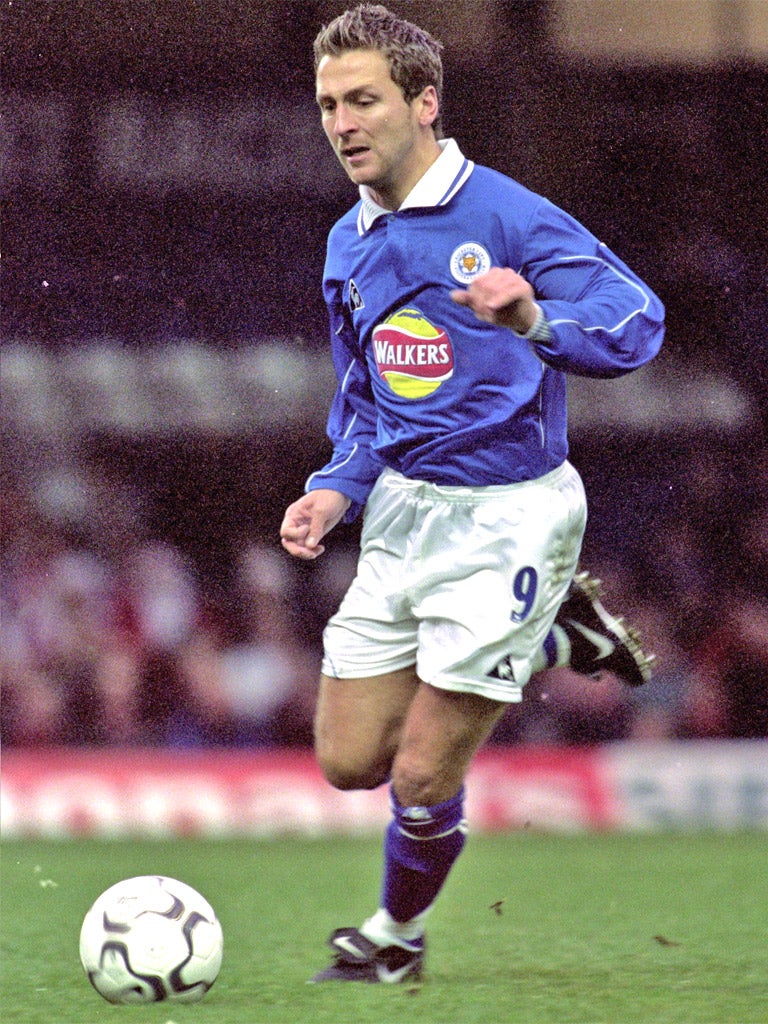Eadie's life after football: depression and panic
When the £3.5m striker's career came to a sudden end through injury, mental illness took a grip and put his marriage at risk. By former Ipswich Town striker James Scowcroft

One minute, Darren Eadie was the Premier League footballer for whom Martin O'Neill had paid £3.5m to bring to Leicester City. The next, he was lying in a hospital bed, his arm covering his face, trying to take in a surgeon's words that his career was over.
Later, he would be hit by a depression so deep that it left him driving around the country lanes of his native Norfolk, so traumatised that he had to stop and call his wife out to come and rescue him. The same illness left him unable to go into the sea with his children on holiday, or to complete a birthday meal with his wife when the panic which was regularly seizing him took over once again. But to begin with, it was only the little things that hit Eadie as he went through the motions of packing up his life and career in a bag, at the Leicester City training ground.
"Everybody says you hang your boots up when your career is finished," Eadie says now. "But you actually take them down."
His story, which asks questions of whether football does enough to help those players who are thrown out before they are ready, begins in the bed of a private hospital in Leicester in 2003, where Eadie was trying to shake off the effects of an anaesthetic, after his third operation in a year on his left knee.
Eadie had encountered problems with his knee before but had always overcome them. A crunching tackle by Scott Parker, in Leicester's game at Charlton on 1 April 2001 was different, leaving him sidelined for months and unable to get back playing. He never would get back. The knee never felt right after pioneering surgery in Sweden in 2002. When running one day he felt "something go" in it and it emerged that one of the cartilage grafts out in place in Sweden had fallen out of place. A repair took place, Eadie went back to the gym, but he felt the same problem. All three grafts had fallen out and that was when more exploratory surgery – in the Leicester hospital – brought him to his moment of truth with the surgeon and Leicester physio Dave Rennie.
"I just knew by the look on their faces that the news wasn't good but the words 'I'd advise you that it would be in your best interests to give football up' were shattering," Eadie says. His first instinct was panic. He was a top Premier League footballer at the time, earning good money. "When I got home and spoke to all my family on the phone, I wasn't sure what to do. My first thoughts were that money would be an issue and I'd have to sell everything to get by. It was unrealistic to be driving around in a Porsche any more. Everybody did their best to keep my spirits up, but the unknown was frightening." He recalls his final day at Leicester when he said his goodbyes, collected his belongings and walked into the boot room to take that pair of his down off the peg.
"That was probably the worst moment," he says. "Being told in a hospital environment wasn't great but going to gather my football bits together, knowing I was going to leave, was the hardest moment."
It was after selling up in Leicester and moving back to the family home in Norwich, that he was finally confronted with the enormity of what lay in front of him.
"At first I was OK [but] I was involved in a couple of business ventures that didn't work out. People that I thought had my best interests at heart didn't. I would go into Norwich and walk around and see everybody else was happy and it depressed me even more. It was a vicious circle. Then the panic attacks started and it was completely debilitating. I'd end up having to call Kelly to come and get me. It was really scary and it paralysed me at times."
The news that his mother had been diagnosed with breast cancer was another blow. "That was devastating, of course. Thankfully, she has had an operation and treatment and is making a great recovery. But… depression is a very lonely place, even with all the support around you." Had he considered taking his own life? No, he says. That is something he could not put his family through.
The help that came from within the game was not all it could have been, he says. "I found the PFA disappointing. When Gary Speed died, the PFA said they would be sending out leaflets to all ex-players about life after football, but nothing ever came through my door. There needs to be a place sportspeople can go to sort their heads out."
Eadie has made it through thanks mainly to his family and today finds himself in a better place. He works in local radio, and also for Sky Sports.
Where the future is concerned, it is still "one step at a time". But he has found focus. "I want to be just as successful in something else as I was at football. Things like this make you better and stronger." The last few years have been long but now he can really say that he has taken those boots down.
James Scowcroft scored almost 100 goals in 500 games as a professional footballer. He is conducting a series of interviews for i
Join our commenting forum
Join thought-provoking conversations, follow other Independent readers and see their replies
Comments
Bookmark popover
Removed from bookmarks